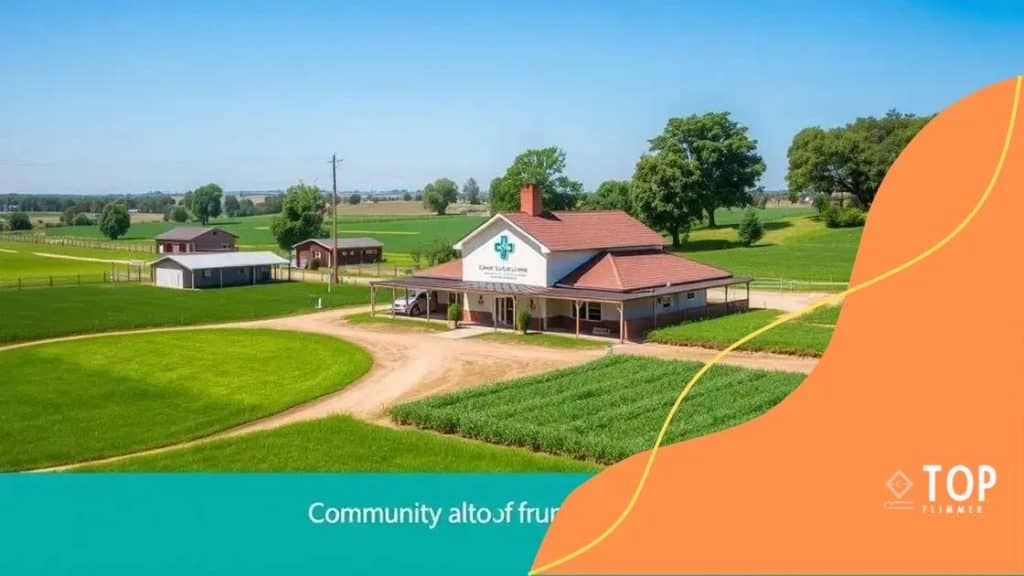Rural healthcare service expansion grants are crucial for communities

Rural healthcare service expansion grants provide critical funding for organizations to improve medical access and facilities in underserved areas, ultimately enhancing community health outcomes.
Rural healthcare service expansion grants play a vital role in enhancing healthcare access in remote areas. Have you ever wondered how these grants impact your community’s well-being? Let’s dive into their significance and explore the benefits they bring.
Understanding rural healthcare challenges
Understanding rural healthcare challenges is essential for improving health outcomes in underserved areas. Many rural communities face unique obstacles that require tailored solutions to ensure adequate healthcare access.
Key Obstacles in Rural Healthcare
Rural areas often struggle with limited resources, which can severely affect their healthcare systems. For instance, fewer medical facilities might be available, leading to long travel times for patients seeking care. Additionally, the lack of healthcare providers can result in overburdened practitioners, affecting patient care quality. Understanding these factors is vital.
- Limited access to specialists
- Higher transportation costs for patients
- Shortage of healthcare professionals
- Inadequate funding for healthcare facilities
These challenges can lead to higher rates of health disparities compared to urban regions. For example, rural residents often experience worse health outcomes for chronic conditions like diabetes and heart disease. Addressing these issues requires an innovative approach.
Innovative Approaches to Overcome Challenges
To tackle these concerns, initiatives must focus on expanding access and improving services. Programs that utilize telemedicine, for example, can connect patients with healthcare providers without the need for long-distance travel. Moreover, strengthening community health programs can enhance local health resource availability.
Furthermore, collaborating with local organizations may provide additional support and resources, including education and prevention programs. The engagement of local communities in health initiatives fosters a greater understanding of specific needs, which can lead to more effective solutions.
Ultimately, recognizing and addressing rural healthcare challenges is crucial for ensuring that all individuals have access to necessary medical services. By doing so, we can work toward building healthier, more resilient rural communities.
Benefits of healthcare service expansion
The benefits of healthcare service expansion are significant, especially for rural communities. Expanding healthcare services can dramatically improve access to essential medical care for residents.
Improved Access to Care
One of the most notable advantages is the increased access to health services. With more facilities available, patients can take advantage of local healthcare options without long travel times. This is particularly important for individuals with chronic conditions who need regular visits to their healthcare providers.
- Reduces patient travel time
- Increases the number of available appointments
- Encourages preventive care
- Helps manage chronic health issues effectively
Furthermore, expanding services can lead to better outcomes for mental health, as individuals receive timely support. In many rural areas, mental health resources are limited. By providing more facilities and qualified professionals, communities can address this pressing need.
Economic Growth and Job Creation
Beyond healthcare access, expanding services supports local economies. New healthcare facilities can create jobs, not only for medical professionals but also for administrative staff and support personnel. A thriving healthcare sector can attract further investments, leading to the development of related businesses.
Moreover, enhanced health services lead to a healthier population. When people can access necessary care, they are more likely to remain productive, which contributes to the economic vitality of the community.
As communities invest in healthcare expansion, they also nurture a culture that values health and well-being. This shift can inspire local initiatives focused on healthy living and preventive care.
Ultimately, the benefits of healthcare service expansion are far-reaching, influencing not only individual health but also community prosperity.
Eligibility criteria for grants

Understanding the eligibility criteria for grants is vital for organizations seeking funding for healthcare expansion. Knowing these requirements can significantly enhance the chances of securing financial assistance.
Key Eligibility Requirements
Most healthcare grants have specific criteria that applicants must meet. These can vary depending on the granting agency and the purpose of the grant. Common criteria include:
- Geographic location: Many grants are aimed at rural or underserved areas.
- Type of organization: Nonprofits, government agencies, and sometimes for-profit entities can qualify.
- Project focus: Grants often target specific health issues, such as mental health, maternal care, or chronic disease management.
- Financial need: Some grants require proof of financial hardship or challenge.
For instance, nonprofit healthcare organizations in rural communities may find several funding opportunities designed specifically for them. These grants aim to improve health resources and access in areas where services are limited.
Documentation and Application Process
To apply for grants, organizations must prepare various documents. This may include tax-exempt status documentation, project proposals, and financial statements. Having these materials ready can streamline the application process. Additionally, letters of support from local stakeholders can strengthen an application, showcasing community commitment to the proposed healthcare project.
It’s also essential to pay attention to deadlines and specific requirements detailed in grant announcements. Failure to follow guidelines can result in disqualification. Engaging with grant officers can provide clarifications and enhance the quality of applications.
Ultimately, understanding the eligibility criteria for grants and preparing accordingly can lead to successful funding opportunities that benefit healthcare services in communities.
Successful case studies of expansion
Exploring successful case studies of expansion provides valuable insights into how healthcare services can effectively grow within rural communities. These examples highlight innovative approaches that lead to improved healthcare access and community engagement.
Case Study 1: Community Health Clinic in Appalachia
In rural Appalachia, a community health clinic implemented strategies to increase patient outreach. By offering telehealth services, the clinic connected patients to specialists who were previously inaccessible. This expansion not only enhanced access but also improved patient outcomes.
- Increased patient satisfaction due to reduced travel.
- More regular follow-ups for chronic conditions.
- Strengthened community trust in local healthcare.
This case demonstrates how integrating modern technology can bridge gaps in healthcare access.
Case Study 2: Mobile Health Units in Texas
Another successful approach was the deployment of mobile health units in underserved areas of Texas. These units provided essential services such as vaccinations, screenings, and wellness checks directly to communities. The initiative addressed barriers like transportation and cost.
Key outcomes included:
- Increased vaccination rates among children.
- Widespread awareness of health resources available.
- Greater community participation in health education programs.
This initiative highlights how reaching out directly to community members can significantly impact public health.
Overall, these case studies of expansion illustrate how tailored approaches can successfully enhance healthcare systems and meet the unique needs of rural populations.
Steps to apply for rural healthcare grants
Applying for rural healthcare grants involves several important steps that can help organizations secure the funding they need. By following these steps carefully, applicants can improve their chances of success.
Step 1: Identify Relevant Grants
The first step is to identify grants that fit the organization’s goals and needs. Research various funding sources, such as government programs, private foundations, and nonprofit organizations. Resources like grant databases can help streamline this process.
- Use online databases.
- Check federal and state programs.
- Inquire with local health departments.
- Network with other health organizations.
Finding the right grants is crucial for alignment with the project goals.
Step 2: Prepare Necessary Documentation
Once you identify potential grants, the next step is to gather all required documentation. This usually includes organizational information, financial statements, and project proposals. Each grant application will have specific requirements, so be sure to follow them closely.
Key documents to prepare may include:
- Tax-exempt status letters.
- Detailed project plans.
- Budget outlines showing funding needs.
- Previous grant reports, if applicable.
Having these documents organized will save time and effort when completing applications.
Step 3: Write a Compelling Proposal
The proposal is vital for grant applications. It should clearly outline the project, explain its impact, and justify the funding request. Use engaging language and make sure to focus on how the project will benefit the community. Address the specific priorities of the grant and demonstrate how the organization aligns with its objectives.
Remember to include:
- Clear goals and objectives.
- Measurable outcomes.
- Community needs assessment.
- Plans for sustainability after the grant period.
This ensures that the proposal is not only informative but also persuasive.
Following these steps to apply for rural healthcare grants can enhance the likelihood of receiving funding and advancing healthcare services in rural areas.
In summary, expanding rural healthcare services through grants is essential for improving community health. By understanding the eligibility criteria and applying effectively, organizations can secure the funding necessary to make a significant impact. Successful case studies show how tailored approaches can overcome challenges and enhance healthcare access in underserved areas. These efforts not only benefit individual residents but also foster overall community well-being. Now is the time for organizations to take action and make a difference in rural health.
FAQ – Frequently Asked Questions about Rural Healthcare Grants
What types of organizations can apply for rural healthcare grants?
Nonprofits, government agencies, and some for-profit organizations can apply, as long as they meet specific eligibility criteria.
How can I find relevant grants for my healthcare project?
You can use online databases, check federal and state programs, or network with local health departments to find suitable grants.
What documents are typically required for a grant application?
Common documents include tax-exempt status letters, detailed project plans, budget outlines, and financial statements.
Why are successful case studies important for applying for grants?
They provide proof of effective strategies and can inspire applicants by showcasing real-life examples of how grant funding has successfully improved rural healthcare.






